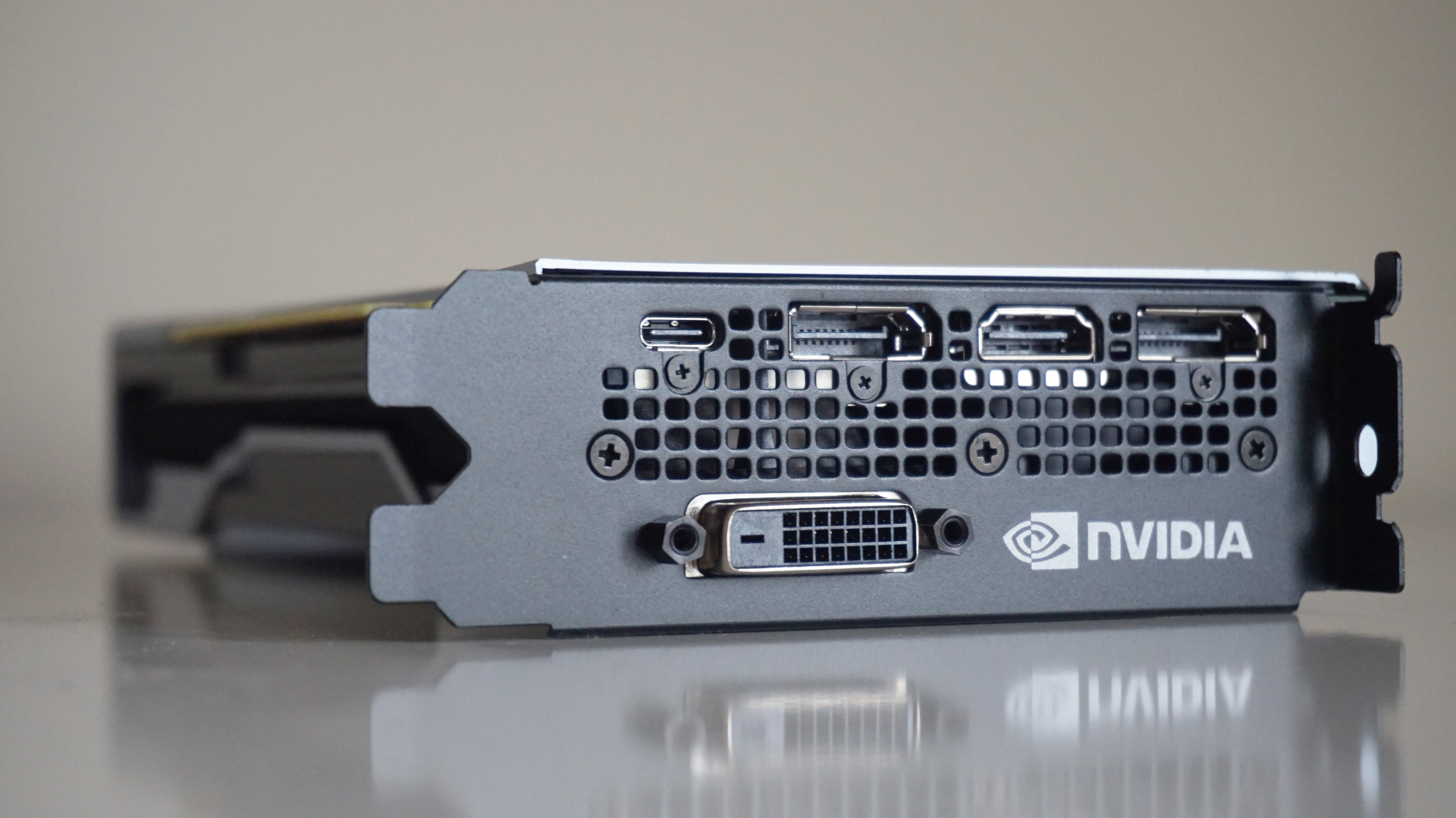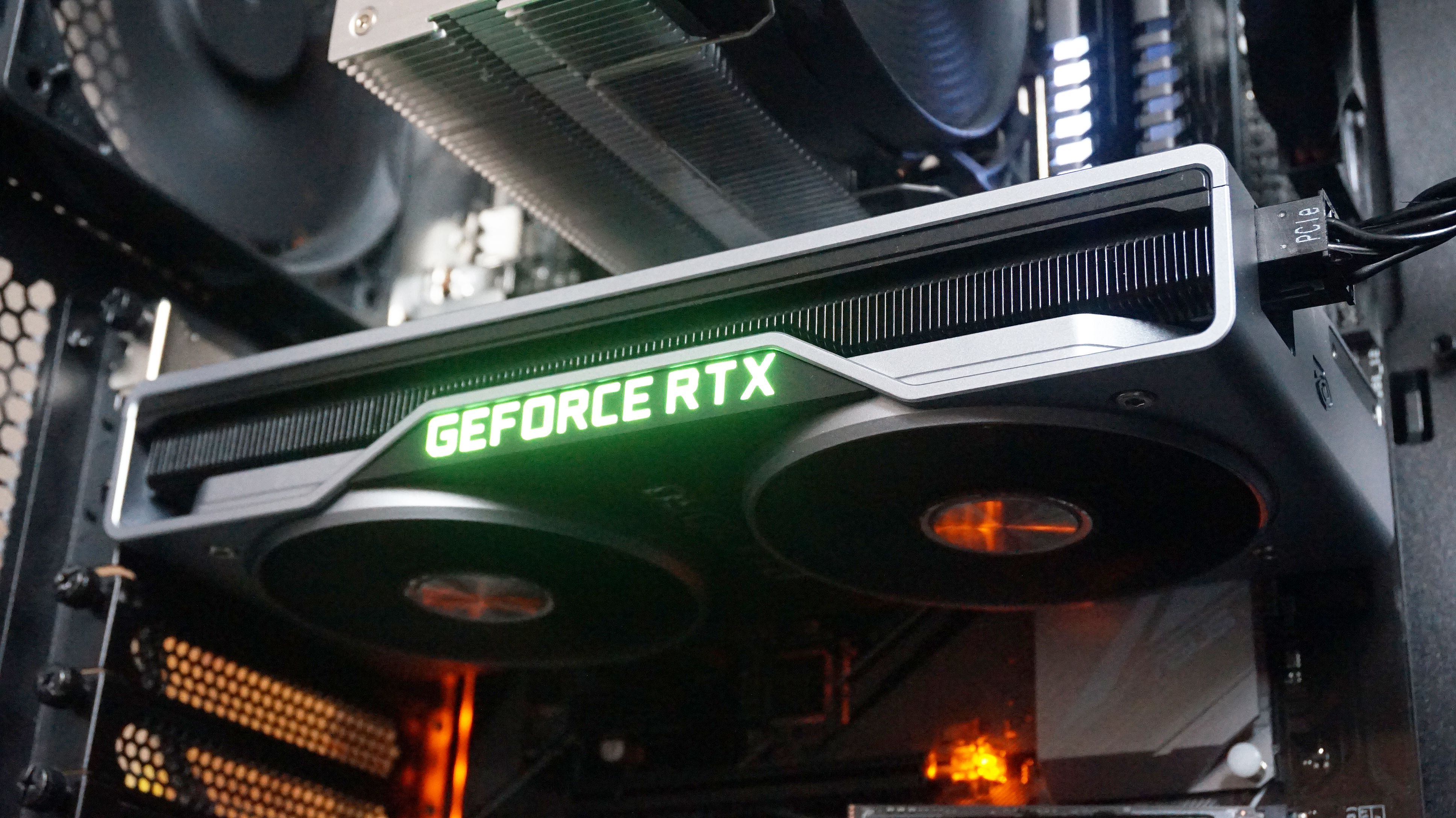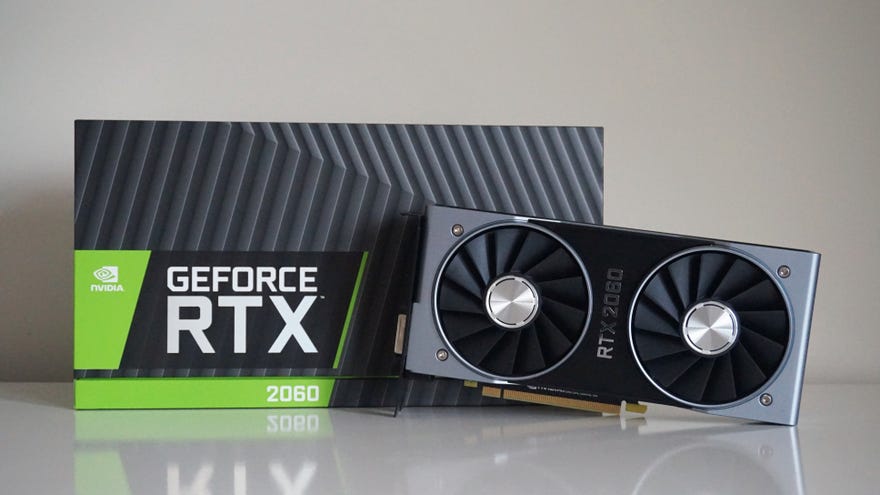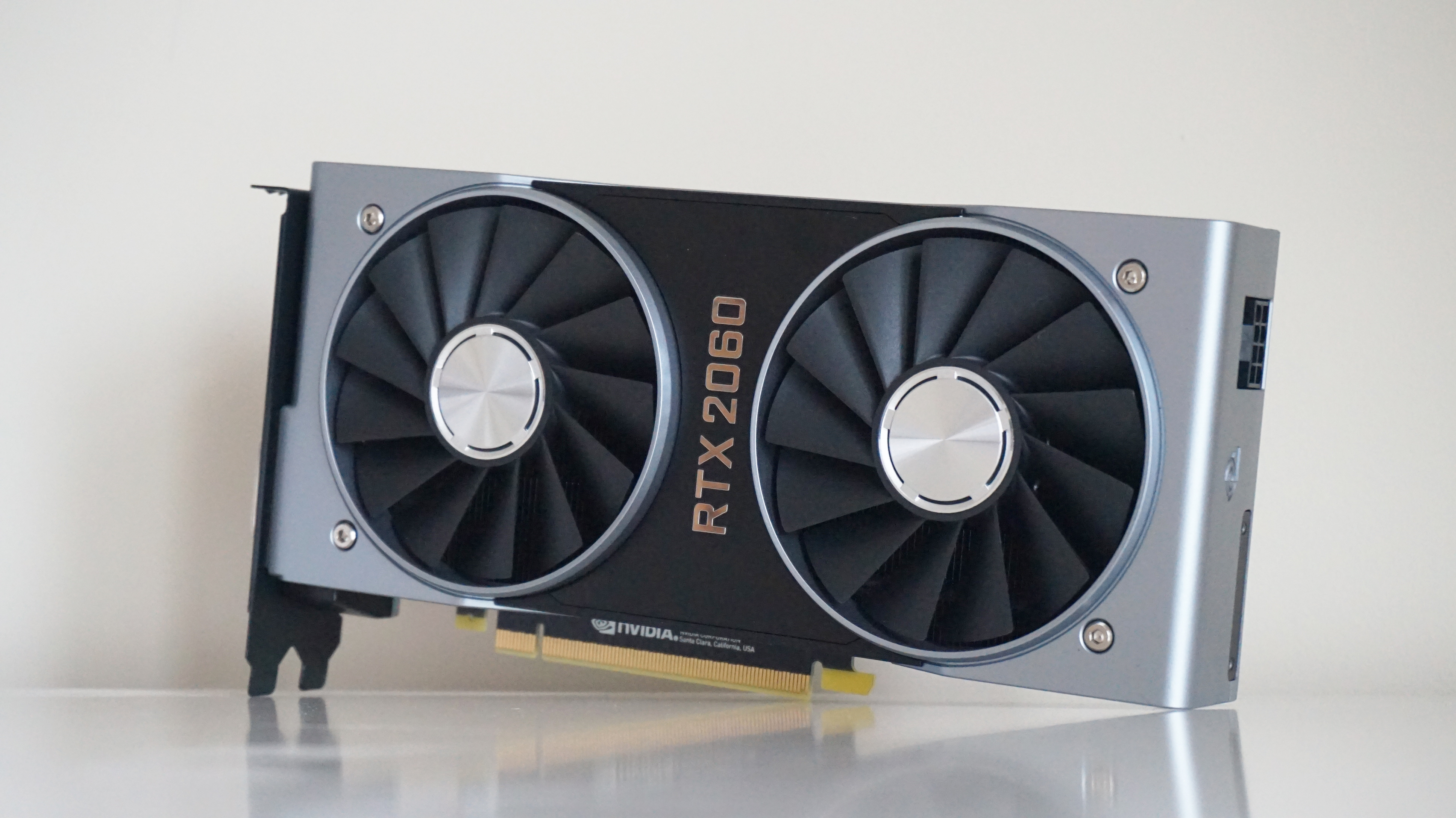Nvidia GeForce RTX 2060 review: Just as good as the GTX 1070Ti for a fraction of the price
Your new best graphics card for 1440p gaming
Ever since Nvidia's GeForce GTX 1060 came out in 2016, it's not only been the de facto, bestest best graphic cards for flawless 1080p gaming, but also the go-to GPU for cash-strapped 1440p-ers, offering smooth, if slightly less shiny, frame rates for a much lower price than Nvidia's more capable GTX 1070 or GTX 1070Ti. It was a fantastic card when it launched for $249, and it continues to be one now for even less, with some of today's cheapest 6GB cards going for $240 / £220.
Its RTX 2060 successor, however, kicks things up a notch. It's another £100 / $100 more expensive than the GTX 1060, with Nvidia's Founders Edition on test here going for £329 / $349 while third party cards currently start at £350 / $350, but when it comes to speed, it's in another league altogether. Whereas the GTX 1060 struggled to hit 60fps on higher quality settings at 1440p, the RTX 2060 sails past that number and then some. It can even push into the realms of 4K without throwing a hissy-fit. In truth, this is what today's GTX 1070 owners should be looking to for their next upgrade, because this, dear readers, is one seriously powerful graphics card that goes way beyond what we'd normally call 'mid-range'.
In hindsight, it's easy to see now why AMD squeaked out their Radeon RX 590 graphics card at the tail end of last year without even a whiff of ceremony about it, because when it comes to stonking 1440p performance, the RTX 2060 utterly wipes the floor with it. The RX 590 is, admittedly, still a lot cheaper than the RTX 2060 (with most cards going for the same price as Nvidia's 6GB GTX 1060 at time of writing), and offers a smidge more performance than both its GTX rival and RX 580 predecessor. But I can't help think that if AMD had decided to release the RX 590 after the RTX 2060, it probably would have been dismissed within 3.87 seconds of its untimely arrival.
Thankfully, AMD didn't do that, and the RX 590's reasonably-sort-of sane pricing means it will continue to have a place among the budget 1440p graphics cards of this world if you can't stump up the cash for the RTX 2060.
If anything, it's Nvidia's own GTX 1070 and GTX 1070Ti that should be worried, as the RTX 2060 effectively makes both of them redundant - and, in the case of the GTX 1070Ti, at a much lower price to boot.

So what are you actually getting with the RTX 2060? That's right. It's numbers time - although some of these figures may vary if you decide to get one of the third party cards instead of the Nvidia Founders Edition I've got here. Regardless of which card you buy, though, every RTX 2060 comes with 6GB of super fast GDDR6 memory clocked at 14Gbps, as well as 1920 CUDA cores (or processing units, if you like to keep things simple). The latter is actually the same number you'll find in Nvidia's GTX 1070, and a whole 640 more than what you'll find on the 6GB GTX 1060.
But wait a minute, I hear you cry, doesn't the GTX 1070 have 8GB of memory? How is the RTX 2060 faster? Well, a lot of that's down to the RTX 2060's nippier memory, which lets it chew through data at a much higher rate - 336GB/s worth, to be precise, compared to just 256GB/s on the GTX 1070 and its Ti counterpart. And as we'll see in just a second, this gives it better overall performance despite the fact it only has 6GB of the stuff as opposed to the 8GB of GDDR5 memory you'll find on the GTX 1070 and GTX 1070Ti.
That's pretty impressive considering the RTX 2060's GPU also has lower base and boost clock speeds than Nvidia's GTX 1060 and GTX 1070 families, with its base coming in at just 1365MHz, while its boost tops out at 1680MHz. These numbers may well be slightly higher on other third party cards out there that have been overclocked straight out of the factory, but the fact remains that the RTX 2060 pulls some serious weight in spite of its slower-running GPU.
Let's talk frame rates then - or at least the kind of frame rates you can expect when you pair it with an Intel Core i5-8600K and 16GB of RAM like I did. At 1080p, you're absolutely laughing with the RTX 2060, as it ploughed through almost every game in my testing suite at a breezy minimum of at least 70fps, if not 75fps in a lot of cases, on maximum quality settings. That includes Shadow of the Tomb Raider, Total War: Warhammer II, Monster Hunter: World and The Witcher III. Assassin's Creed Odyssey had to make do with 'just' 60fps on Ultra High when I ran its internal benchmark, all told, but was quickly back up at 71fps on the next setting down, which is still Very High. Doom and Forza Horizon 4, meanwhile, were dashing off averages closer to 100 / 120fps on their respective Ultra settings, making this the perfect partner for a high refresh rate 1920x1080 monitor (which you should totally have a look at in our best gaming monitor guide if you don't already have one).

The only game where it dipped below that hallowed 60fps at 1080p was, you guessed it, Final Fantasy XV. Here, you're looking at an average of around 55fps, with the occasional low of 40fps, but that's with everything whacked up to eleven, including all of Nvidia's fancy pants lighting effects. Disable VXAO and you'll be back up at a full 60fps+ in no time at all.
Thing is, though, you probably don't need to spend this kind of money on a 1080p graphics card if all you're after is something that can do 60fps on high or max settings. The 6GB GTX 1060 or RX 590 are more than enough for that.
Where the RTX 2060 really comes into its own is gaming at 2560x1440. Here, the RTX 2060 trounces its cheaper competition and roundly smashes its more expensive rivals, producing near flawless 60fps frame rates on maximum or so-very-near-Ultra-it-might-as-well-be settings pretty much across the board.
Let's take Assassin's Creed Odyssey as our first example. On Ultra High, the RTX 2060 averaged an impressive 47fps at 1440p when I ran put it through its internal benchmarking tool, and an even silkier 59fps on Very High. By contrast, I had to drop the GTX 1060 and RX 590 down to Medium just to get them over the 50fps mark, and even the GTX 1070 could only manage an average of 55fps on the same Very High setting (its Ultra High average being a similar margin of 4-5fps behind at 43fps). Indeed, only the GTX 1070Ti proved an adequate match for the RX 2060 at this resolution, managing an average of 46fps on Ultra High and 54fps on Very High.
The RTX 2060 impressed in Monster Hunter: World, too. On Highest, I managed a perfectly playable average of 45fps when I took a tour of the game's opening swamp area, which rose to 63fps when I nudged the settings down to High. The former simply isn't possible on the GTX 1060, which got stuck in the mud around 26fps when I took the same route, and even High is a fairly choppy average of 40fps. The RX 590 is mildly better, but you're still only looking at low 30s and 40s on each quality setting. As for the 1070s, the GTX 1070Ti was once again just a couple of frames behind, coming in at 43fps on Highest and 62fps on High.

The gap was even bigger in Shadow of the Tomb Raider, where the RTX 2060 was more than 10 frames ahead of the GTX 1070Ti on Highest with its SMAATx2 anti-aliasing option enabled. Here, it delivered frame rates ranging between 58-75fps in the game's Cozumel Caves section, compared to the GTX 1070Ti's 47-63fps. Even the GTX 1080 only managed between 56-79fps when I put together my Shadow of the Tomb Raider graphics performance guide, which is pretty damn amazing considering how much it costs.
I'll spare you the details of all my other results, as I fear I'd only be repeating myself, but needless to say, the picture was pretty much the same across the board. If the RTX 2060 wasn't ahead of the GTX 1070Ti, it was pretty much toe-to-toe with it, such as in Total War: Warhammer II where they both scored an identical average of 52fps on its Ultra-fied battle benchmark, or Forza Horizon 4 where they had photo-finish results of 80fps and 82fps averages respectively. The rest (i.e: the GTX 1070, GTX 1060 and RX 590) were left behind in the dust.
The RTX 2060 even proved its worth as an entry-level 4K card as well, and I don't mean whacking everything down to Low and hoping for a best case scenario of 30fps kind of entry-level either. Much like the GTX 1070Ti, you'll get a highly playable 40-50fps on Medium or above settings in most cases, although there will always be a few toughies that are simply too much for it, even at a lower quality (*cough*Monster Hunter and Final Fantasy XV*cough*).
But that's just what the RTX 2060 can do in terms of raw performance. Add in all of other clever RTX gubbins, such as their really very nifty DLSS support (see here for a full list of confirmed ray tracing and DLSS games), and some of those aforementioned toughies become really quite tamable. Take Final Fantasy XV, which stuttered along at 34-39fps on Average at 4K with all of Nvidia's extra effects turned off, but whizzed up to a much smoother 43-45fps when I turned on DLSS in its anti-aliasing menu.
That's something the GTX 1070Ti really can't compete with - or at least not in theory, as even now Final Fantasy XV is still just one of two games out at the moment that actually have their DLSS support available in-game (the other being Battlefield V, which I'll be doing a separate performance investigation on very soon, because this is also the only game that actually has any of its titular reflection-enhancing ray-tracing tech, too). The rest, DLSS and ray-tracing games alike, are all still MIA and really need to hurry the hell up. It won't make the blindest bit of difference if you're not planning on playing any of the games that support DLSS, of course, but provided it becomes more widespread as the months go on (and get confirmation for a wider number of upcoming games), it can only paint the RTX 2060 in a more favourable light compared to its GTX rivals.
The most compelling thing about the RTX 2060, though, isn't all the Turing stuff that makes it special. It's the price, which is something the RTX 2080, RTX 2080Ti and even the RTX 2070 didn't really have on their side when they launched at the end of last year. The tide has turned a bit now, but when those first came out, they were all either more expensive than their nearest GTX counterpart, or only a teensy bit more powerful. The RTX 2060, on the other hand, sits firmly on the right side of the power/price line for me, offering as much, if not more juice than the GTX 1070Ti for a fraction of its cost. £329 / £349 compared to $430 / $480 is an appreciable saving in my book, which is why it's my recommended card for 1440p gaming, period. No 'what you should actually buy' recommendations instead. Just this.
I know a lot of you were worried about Nvidia pushing up the price of the so-called 'mid-range' with the RTX 2060, but remember - we haven't had the inevitable RTX 2050 yet, which I'm almost certain will be the proper, like-for-like GTX 1060 replacement you've been waiting for, with a sub £300 / $300 price to match. The goal posts have moved with the RTX 2060, and given the kind of results I've just described, I don't think we can really say we're in traditional mid-range territory any more. Just like the GTX 1070Ti before it, the RTX 2060 sits just on the border where the mid-range meets the high-end, albeit at a far more tempting price than anything Nvidia's managed before.
I'm not just parroting marketing fluff at you, either, as I myself rather reluctantly bought a GTX 1070 for £320 back in 2016, just when prices were starting to creep up before they went completely insane. It was a decent price at the time I wanted to buy one, as I really wanted something that could play The Witcher III at 1440p on pretty much max settings. The GTX 1060 wasn't good enough for that, and the GTX 1080 was way out of my price range. Even once I'd got the GTX 1070 home, though, I still wasn't completely happy with it. If I'd had the option to buy something like the RTX 2060 instead for the same kind of money, though? I'd have jumped on it in a heartbeat.
If you're after a new graphics card for nigh-on perfect 1440p gaming at 60fps, this is your next upgrade.


